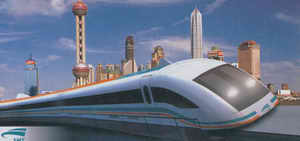| Thirty Years with A Future |
| http://www.sina.com.cn 2003/05/26 11:41 中国周刊 |
Interview with the Ambassador of Germany to China By Liu Jianhui
Ambassador: Since the establishment of diplomatic relations between Germany and the People's Republic of China 30 years ago, a close network of exchange has been set up between our two countries. Frequent high-level visits, including Federal Chancellor Gerhard Schruder's trip to China last autumn and President Jiang Zemin's visit to Germany last spring, have intensified political dialogue, mutual understanding and cooperation. Intensive economic exchange is the cornerstone of our relations. Trade relations have their roots in the late 19th century, when the first German companies set foot in China. In 1866?for example, a negotiator of Essen's Krupp was sent for the first time to China still under the Qing Dynasty to deliver steel tracks and railway materials. In 1872, Siemens supplied the first pointer telegraph to China. Many other German companies followed and set up delegations in China. Of course, by China's opening in the late 1970s, the exchanges between the two countries subsequently reached a more intense level. Sofar Germany is China's largest European trading partner. In the first half of this year, German exports to China rose by 18 percent to reach 6.6 billion euros (US .5 billion). German imports from China were even larger, amounting to 9.8 billion euros (US .6 billion). In the past three years Germany has been China's main European investor. Till now, about 1,800 German companies have settled in China: Volkswagen established production centres in Shanghai and Changchun; Siemens undertakes about 60 joint ventures with diversified products ranging from mobile phones to medical equipment, power plants and transportation technology; Thyssen Krupp is finalizing the huge engineering project of the gransrapid high speed magnetic levitation train to link Pudong Airport and Shanghai City. These and many other remarkable investments in high-tech sectors show that bilateral economic relations have proven to be a great success. With China's accession to the World Trade Organization the network of exchange will enlarge even further in the future. Chinaweek : How about the cultural exchanges between the two countries?
Education and science are especially notable areas of cooperation. The number of Chinese students studying in Germany has roughly doubled every year for the past five years and increased to about 20,000, with 10,000 enrolled in universities and another 10,000 in preparatory courses. Above, there are over 1,000 Chinese scientists conducting research in Germany. Academic exchange is the foundation for our future co-operation which will strongly benefit from German-educated Chinese who return to China to help building up their country while keeping their links with Germany. The mounting mutual interest, curiosity and the willingness to learn are essential pillars for global peace and stability. Chinaweek: What activities did your embassy hold recently? Are there any important activities in the near future? Ambassador: This year on Oct. 11, we celebrated the 30th anniversary of the establishment of Sino-German diplomatic relations. The German cultural and industrial show at the Chinese Millennium Monument under the slogan 0 years with a future? initiated by the German Chamber of Commerce in Beijing under the auspices of the German Embassy, showed the close network of economic, trading and cultural exchange between our countries. More than 100 German institutions and companies such as Siemens, Thyssen Krupp, Bayer or VW were involved in the event. In an impressive way they showed their diversified activities in China. About 180.000 people have come to see the show at the Millennium Monument. In the cultural and educational field, Germany has close interactions with China within the scope of programmes initiated by the Goethe Institute in Beijing, the DAAD (German Academic Exchange Service), the Sino-German Science Center and a large number of German and Chinese universities. Beyond these programmes, there are various private activities promoting cultural and educational exchange. These projects and the growing mutual interest of the younger generation enrich our bilateral relations and are the basis of our future co-operation. When relations are as close as they are between our two countries there are always many important projects and visits in the pipeline. Chinaweek: What's your impression about China after your arrival in China?
Chinaweek: China is becoming a main tourist destination. Do you have travel experience in China? Ambassador: Unfortunately I don't have much time to travel. The cities I visited, above all Shanghai, but also Nanjing and Changchun gave me the impression that China is in the course of rapid modernization and development in every sector. The improved infrastructure of the cities as well as the economic growth and the mounting awareness of environmental problems are clearly visible and impressive. I first came to China when I was Vice-Consul in Hong Kong in 1972. It was just the time when the Sino-German diplomatic relations were established. At that time, I visited Guangzhou and its surroundings with a number of journalists and I got a deep impression of China at that time. Today I can say that the development of this country since the opening and the beginning of reforms in the late 1970s has been astonishing and impressive. In Germany China is known as a country with a long history and rich culture. More and more Germans discover China as an important tourist site with interesting cultural relics and scenic spots. The number of German tourists has been growing steadily. The inauguration of a new Lufthansa Shanghai-Munich flight bears witness to this development. Besides, the economic growth of your country is impressive to every German visiting China. Chinaweek: What personality had the deepest impact on your political career? Ambassador: The political personality whose political thoughts had the most important impact on me was Willy Brandt, German Chancellor from 1969-1974. From 1973 to 1974 I was priviledged to work as his personal assistant and to observe this remarkable human being and winner of the Nobel Peace price. Chinaweek: How is your relationship with your Chinese friends? Ambassador: One of my longtime Chinese contacts is former Ambassador Wang Shu whom I met for the first time when he was a journalist in Germany. Wang Shu, who became the first Chinese ambassador in Bonn in 1972, is one of the many personalities who have promoted and influenced the development of good relations between our two countries. His recent book about the history of Sino-German diplomatic relations testifies to the strong political willingness of our countries to deepen our friendship. Chinaweek: It is said that Germany has a very good social welfare system. The social security system is very sound. What factors do you think can China use for reference? Ambassador: It is important to note that a social welfare system as ours places a heavy burden on the budget. It becomes more and more difficult for the government to finance it. More and more people think that the system has to be restructured, however without loosing sight of the aim of social justice. Chinaweek: What do people in Germany think of China's family planning policy? As you know some countries regard the familiy plannig policy as a violation of Human Rights. Ambassador: The situation of China is different. China is a large country with a large population and has a different historical background. To some extent China has to control the growth of its population. Most Germans understand this. They would not think that this is a violation of Human Rights. Chinaweek: What do you think of China's unemployment issue in the process of state-owned companies?reform? Ambassador: The reform of the state-owned companies is a necessity. Germany also went through such a period of restructuring after reunification. The unemployment rate in the eastern part of Germany is still higher than in the western part. But unemployment also means that new jobs are created in other sectors of the economy. So does China now. Chinaweek: What do you think of Beijing's weather? I heard that Germany is in a temperate zone and that the weather changes little during the year. Ambassador: I think the weather in Beijing is quite good. The winter here is more pleasant than it in Germany. The sky became bluer owing to Chinese government's efforts to reduce air pollution. It's really pleasant. |
| 【英语学习论坛】【评论】【大 中 小】【打印】【关闭】 |

 Chinaweek: Thank you very much forshavingsthis interview with me. Germany is China's largest trade partner in Europe; could you comment on trade relations and economic cooperation between our countries?
Chinaweek: Thank you very much forshavingsthis interview with me. Germany is China's largest trade partner in Europe; could you comment on trade relations and economic cooperation between our countries? Ambassador: The cultural exchange projects between the People's Republic of China and Germany are an essential pillar of German-Chinese relations and remain important for a better understanding on both sides. They have become frequent and intensive and are being initiated at all levels of society. While the two governments continue to strongly support all sorts of cultural and educational exchange, more and more projects are organized by private groups.
Ambassador: The cultural exchange projects between the People's Republic of China and Germany are an essential pillar of German-Chinese relations and remain important for a better understanding on both sides. They have become frequent and intensive and are being initiated at all levels of society. While the two governments continue to strongly support all sorts of cultural and educational exchange, more and more projects are organized by private groups. Ambassador: Since I arrived in Beijing last year, I have had the impression that the Chinese metropoles are developing extremely fast. I am thoroughly convinced that China succeeds in clatching up with other modern and fully developed countries within a fairly short time. Shortly after I arrived in Beijing last year, China entered the WTO. The German Government and the EU strongly supported your WTO-membership, and I'm convinced that this step and the decision to hold the Olympics 2008 in Beijing will further stimulate the economic development and modernization of the whole country. As for my life here, I can say that I feel at home in Beijing.
Ambassador: Since I arrived in Beijing last year, I have had the impression that the Chinese metropoles are developing extremely fast. I am thoroughly convinced that China succeeds in clatching up with other modern and fully developed countries within a fairly short time. Shortly after I arrived in Beijing last year, China entered the WTO. The German Government and the EU strongly supported your WTO-membership, and I'm convinced that this step and the decision to hold the Olympics 2008 in Beijing will further stimulate the economic development and modernization of the whole country. As for my life here, I can say that I feel at home in Beijing.